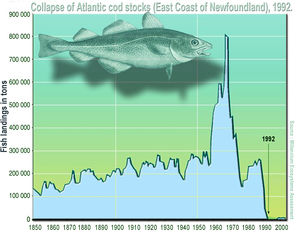Overuse

Under overuse is defined as the use of resources in an excess without regard to the consequences. Examples of overuse are overgrazing , overhunting or overfishing , but also irreversible soil erosion , deforestation or lowering of the groundwater . Continued overexploitation can lead to the destruction of the natural resource or to the extinction of the hunted species. The eutrophication and other pollution types are closely associated with a landscape overuse. In contrast to overuse is sustainability . Overuse can be a direct consequence of local and global overpopulation and the need for food security , but it can also be caused by the pursuit of profit without immediate human needs.
Economy
From the point of view of economics, overexploitation is a property of common goods . These are those public goods whose use cannot be excluded or only with disproportionate effort and whose use there is rivalry between users. Examples are common goods such as the historical commons . Hence one speaks of the tragedy of the commons .
It is a social dilemma : each individual has an incentive to increase the use of the common good, but the resulting overuse lowers the output of society as a whole.
history
Overuse of natural resources has accompanied mankind for thousands of years.
For example, overhunting by humans, probably in addition to climate changes, is the main reason for the Quaternary extinction wave , the Ice Age extinction of many large animal species in many parts of the world at the time of their first human settlement.
In the 5000 years of Chinese civilization , one third of the arable land was lost through overexploitation .
Overexploitation
Also, the over-exploitation in mining is a form of overuse. Depletion is therefore the metaphor has become indicative of a overuse. One speaks of "overexploitation of the body" or "overexploitation of health" if the body is stressed beyond the limit and thus damaged (e.g. in labor law as a justification for working time regulations ). Another example of a metaphorical use is the catchphrase of the "overexploitation of nature".
literature
- Jörg Beutel: Mikroökonomie, 2006, ISBN 978-3-486-59944-2 , p. 342 ff.
Web links
Individual evidence
- ↑ Kenneth T. Frank, Brian Petrie, Jae S. Choi, William C. Leggett, Trophic Cascades in a Formerly Cod-Dominated Ecosystem, Science 2005, pp. 1621-1623, online .
- ↑ Holger Rogall: Ecological Economics: An Introduction, 2013, ISBN 978-3-322-99733-3 , p. 22, online .
- ^ Friedrich Kluge: Etymological Dictionary of the German Language, 24th edition, 2002, ISBN 3-11-017473-1 , p. 746.
- ^ Walter Kaskel: Arbeitsrecht Enzyklopädie der Rechts- und Staatswissenschaft, 2013, ISBN 978-3-642-85649-5 , p. 253, online .
- ↑ Otto Schlecht: Foundations and Perspectives of the Social Market Economy, Volume 27 of investigations on the theory of order and policy, 1990, ISBN 978-3-16-145684-8 , p. 34 [1] .